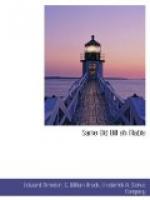At pp. 152-175 of the same volume, Dr Sweet gives 1204 Kentish glosses of a very early date. No. 268 is: “Cardines, hearran”; and in several modern dialects, including Hampshire, the upright part of a gate to which the hinges are fastened is called a harr.
Several years ago, M. Paul Mayer found five short sermons in a Kentish dialect in MS. Laud 471, in the Bodleian Library, along with their French originals. They are printed in Morris’s Old English Miscellany, and two of them will be found in Specimens of Early English, Part I, p. 141. The former of these is for the Epiphany, the text being taken from Matt. ii 1. The date is just before 1250. I give an extract.
The kinges hem wenten and hi seghen the sterre thet yede bifore hem, alwat hi kam over tho huse war ure loverd was; and alswo hi hedden i-fonden ure loverd, swo hin an-urede, and him offrede hire offrendes, gold, and stor, and mirre. Tho nicht efter thet aperede an ongel of hevene in here slepe ine metinge, and hem seide and het, thet hi ne solde ayen wende be herodes, ac be an other weye wende into hire londes.
That is:
The kings went (them), and they saw the star that went before them until it came over the house where our Lord was; and as-soon-as they had found our Lord, so (they) honoured him, and offered him their offerings, gold, and frankincense, and myrrh. The night after that (there) appeared an angel from heaven in their sleep, in a dream, and said to-them and commanded, that they should not wend again near Herod, but by another way wend to their lands.
In the days of Edward II (1307-27) flourished William of Shoreham, named from Shoreham (Kent), near Otford and Sevenoaks, who was appointed vicar of Chart-Sutton in 1320. He translated the Psalter into English prose, and wrote some religious poems, chiefly relating to church-services, which were edited by T. Wright for the Percy Society in 1849. His poem “On Baptism” is printed in Specimens of Early English, Part II. I give an extract:
In water ich wel the cristny her{1}
As Gode him-self hyt dight{e}{2};
For mide to wessch{e}{3} nis{4} nothynge
That man cometh to so light{e}{5}
In
lond{e}{6};
Nis non that habben hit ne may{7}
That habbe hit wil{e} found{e}{8}.
This bethe{9} the word{e}s of cristning
By thyse Engl{’i}ssch{e}
cost{e}s{10}—
“Ich{11} cristni the{12} ine the
Vader{13} name
And Sone and Holy Gostes”—
And
more,
“Amen!” wane hit{14} is ised{15}
thertoe,
Confermeth thet ther-to-fore{16}.




